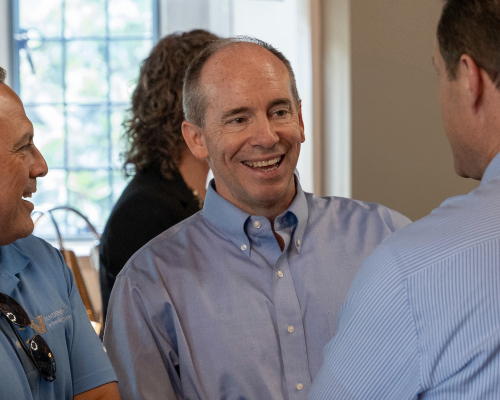Alan is the Assistant Vice Chancellor for Technology Transfer & Intellectual Property Development.
He joined the Vanderbilt Center for Technology Transfer and Commercialization (CTTC) in 2011, where he has been instrumental in shaping a culture of innovation and collaboration. Since his arrival, Alan has focused on strengthening faculty engagement, streamlining making technology transfer processes, and creating new pathways for research commercialization. In doing so, he has positioned CTTC as a catalyst for entrepreneurship by launching programs for startup support, facilitating seed investments, and fostering connections across disciplines.
In addition to leading CTTC, Alan is a dedicated member of the premier technology transfer professional organization (AUTM) and has developed and teaches AUTM’s professional development courses on Startups and on Negotiations. Today, he leads a powerhouse team of professionals and is passionate about reshaping the future of innovation advancement at Vanderbilt.
WE CAUGHT UP WITH ALAN TO LEARN MORE ABOUT HIS PASSIONS AND VISION:
What inspired you to join Vanderbilt and its technology transfer team?
Interestingly, Vanderbilt was on my radar due to the impressing rise they achieved over a short (~10 year) period in terms of improving their academic and research rankings. It is so difficult to move a place or two in the rankings, and Vanderbilt jumped up a dozen slots in some of the key nationally recognized rankings. One could argue the importance of such rankings, but it was just something I noticed, and made me think that maybe Vanderbilt would be a great place to work and contribute. So when my current position was posted, I applied with enthusiasm. Turns out I was right – it is a great place, but in truth nobody warned me how hot it gets in June, and July, and August, and most of September.
What do you admire about the people you work with?
We have an uber experienced and talented team – at least a half dozen of our colleagues has the experience and expertise to direct other technology transfer offices, and they have worked in other systems at other universities, bringing to Vanderbilt varied and valuable perspective. They are all maniacally focused on service and faculty satisfaction, and always ready to embrace any new challenge the job throws at them.
What is the most rewarding aspect of your role?
Every so often, I get to witness a technology that truly impacts people’s lives — and sometimes even saves them. The Indego exosuit and the Evusheld therapeutic antibody are just a couple of examples. It often takes a long enough career arc at one institution to experience moments like this, but I’ve been very fortunate to have experienced several of them at Vanderbilt. That kind of public benefit impact is why we do what we do.
What areas or new initiatives are you most excited about?
I’m really excited about the opportunity to help shape the conversation around redefining innovation advancement on campus and beyond. We’ve been exploring ways to better frame that conversation by focusing on what we call the essential types of “ecosystem capital” — Financial, Intellectual, Human, and Physical Capital. By aligning our efforts and new programs with intent of increasing one or more of these types of capital, we can be confident that we are contributing to a more dynamic and robust innovation ecosystem, while also strengthening the ultimate form of capital - our Reputational Capital.
How do you see the field of technology transfer evolving over the next 5–10 years?
Technology transfer has evolved significantly in a relatively short period. What started primarily as licensing in the ’80s and early ’90s grew into new venture support, industry collaborations, and translational research in the 2000s. Today, we’re supporting seed investments, working with accelerators and incubators, and supporting economic development at both the regional and federal levels — all while managing traditional licensing and startup activities. The technology transfer professional must be an adaptable, out of the box thinker – and somewhat fearless – to be effective.
What do you do for fun?
If you love what you do, work can be a source of satisfaction and enjoyment. But aside from that, now that we have successfully graduated two great kids, my wife and hope to have more time to travel and enjoy different places and different cultures.
What is a fun fact about you?
I’m not really bald, I am just faking it for effect…please don’t tell anybody.
